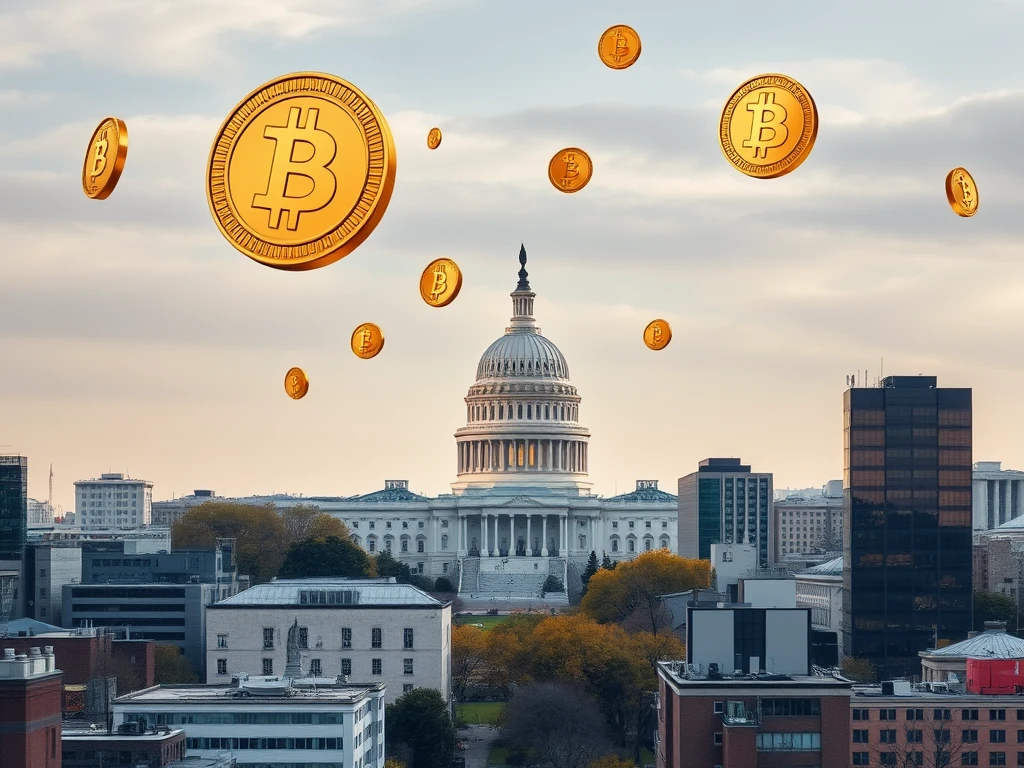Unlock Crypto Retirement: US Lawmaker Revives Bill to Empower Savings and Fuel Trump’s Crypto Vision

In a bold move to reshape retirement savings and potentially bolster Donald Trump’s cryptocurrency agenda, US lawmaker Senator Tommy Tuberville is set to reintroduce the Financial Freedom Act. This renewed effort marks the senator’s third attempt to pass legislation that would permit Americans to include cryptocurrencies within their 401(k) retirement plans. After two previous unsuccessful bids in 2022 and 2023, the Alabama senator is undeterred, citing a desire to empower individual investors and align with the perceived crypto-friendly stance of former President Trump.
Empowering Retirement Savings with Crypto: The Financial Freedom Act Returns
Senator Tuberville’s announcement came during a Fox News interview on March 31st, where he passionately defended the Financial Freedom Act. He emphasized the need to “give people a chance to breathe for once” and “let them do what they do best [which] is invest their money.” This strong rhetoric underscores the core principle behind the bill: individual financial autonomy. The Act directly challenges existing regulations that, according to Tuberville, unduly restrict the investment choices available to retirement savers.
What is the Financial Freedom Act and Why is it Important for Crypto Retirement?
First introduced in May 2022, the Financial Freedom Act directly targets regulations imposed by the Department of Labor. These regulations, in their current form, are seen by proponents like Senator Tuberville as overly cautious and restrictive when it comes to including digital assets in 401(k) plans. The bill seeks to scale back this regulatory oversight, arguing that individuals should have the freedom to choose how they invest their retirement funds, including exploring the potential of cryptocurrency.
- Expanding Investment Options: The primary goal is to broaden the scope of permissible investments within 401(k) plans to include cryptocurrencies.
- Challenging Regulatory Restraints: The Act aims to limit the Department of Labor’s authority in dictating the types of investments allowed in retirement plans.
- Promoting Individual Choice: It champions the principle that individuals are best positioned to make informed decisions about their financial futures.
Trump’s Crypto Agenda and the Bill’s Potential Impact
Senator Tuberville explicitly linked his renewed push for the Financial Freedom Act to supporting Donald Trump’s perceived pro-crypto stance. This connection highlights the growing political dimension of cryptocurrency regulation in the US. With Trump increasingly embracing digital assets, legislation like the Financial Freedom Act could be seen as a key component of a broader strategy to foster crypto innovation and adoption within the nation.
However, the path forward is not without obstacles. The bill’s previous iterations failed to progress beyond the committee stage, indicating significant hurdles in gaining bipartisan support and overcoming regulatory concerns. Critics often point to the volatility and nascent nature of the crypto market as reasons for caution within retirement savings.
Challenges and Considerations for Crypto in Retirement Savings
Integrating cryptocurrencies into retirement plans presents both exciting opportunities and considerable challenges. Understanding these is crucial for anyone considering or advocating for crypto retirement options.
| Aspect | Potential Benefits | Potential Challenges |
|---|---|---|
| Investment Diversification | Cryptocurrencies can offer diversification beyond traditional assets like stocks and bonds. | The correlation of cryptocurrencies with other asset classes can fluctuate, and diversification benefits are not guaranteed. |
| Growth Potential | The crypto market, while volatile, has demonstrated significant growth potential over time. | High volatility can lead to substantial losses, especially in retirement accounts with limited time to recover. |
| Inflation Hedge | Some argue that cryptocurrencies, particularly Bitcoin, can act as a hedge against inflation. | This claim is still debated, and the effectiveness of cryptocurrencies as an inflation hedge is not definitively proven. |
| Regulatory Uncertainty | Increased regulatory clarity could boost investor confidence in crypto retirement options. | The evolving regulatory landscape creates uncertainty and potential compliance burdens for retirement plan administrators. |
| Security and Custody | Advancements in secure storage solutions are making crypto assets safer to hold. | Security risks, including hacking and theft, remain a concern, particularly for less experienced investors. |
Looking Ahead: The Future of Crypto Retirement and the Financial Freedom Act
As Senator Tuberville prepares to reintroduce the Financial Freedom Act, the cryptocurrency community and retirement savers alike will be watching closely. The bill’s success or failure could have significant implications for the future of crypto retirement in the United States. If passed, it could unlock new avenues for wealth building and further mainstream adoption of digital assets. However, navigating the regulatory complexities and addressing concerns about risk and volatility will be paramount.
This is a developing story, and further updates will be provided as they become available. Stay tuned for the latest on the Financial Freedom Act and its potential impact on your retirement savings.









